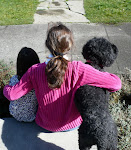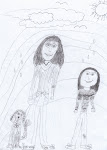First, an apology. I am woefully overdue in posting here at Pack of Three. The good news is that all is well with our happy pack. In fact, as much as the past school year had its challenges, the summer seems to have delivered -- in direct opposition and proportion to the school year -- more than its share of joys. My daughter's favorite t-shirt and personal motto these days? Life is Good.

I have to concur. I'm not immune to a hormonal moment or two, but the truth is, its all too easy to forget and take for granted just how blessed we are.
Until the school year is well underway (and mom makes more progress on the job front,) I won't have a lot of time for blog posts. Nevertheless, I had to check in and share a link to a wonderfully insightful, honest, thought-provoking article written by Martha Nichols, published this summer in BRAIN, CHILD: "What's My Heritage: International Adoptions and the Culture Debate."
Martha and her husband adopted their son Nicholas from Vietnam in 2003. She writes about Nicholas' ambivalence toward his birth country and culture and, more specifically, writes about her own struggle to find the right balance in helping acquaint her son (and family) with Nicholas' birth country and culture, addressing thorny issues of race and identity.
How much should we do as parents? How far do you take it -- or push it?
It's a balancing act most parents of internationally adopted children struggle with. We know, based on the overwhelming evidence shared by previous generations of Korean-American adoptees, that we ignore these questions of race and culture at our child's peril. But Nichols raises another interesting question: Has the current generation of parents of internationally adopted children really figured out the best or healthiest way to address these issues? The options -- and pitfalls -- are many.
Some families purchase cheese-y costumes and trinkets. Others enroll their children in a myriad of dance classes, language classes, craft classes, caligraphy classes, even martial arts classes. Others drop in once a year for a token New Year's or other celebration. These efforts are all made in earnest. But Nichols asks the uncomfortable question if culture is really a matter of consuming a couple of commercial pre-packaged trinkets, if its a series of classes, a one-time event, or an annual weekend retreat.
How many of us reach for these things as quick, easy answers so, in busy, overscheduled lives, we can assuage a guilty conscience and check off the "culture" box? Nichols calls it "Culture-lite."
My guess is most adoptive parents sense, like Nichols, that culture and identity tend to be something both more subtle -- and more elusive, something that's woven into everyday life. It's the language we speak, the foods we eat, the faces we see, the little day in and day out, or seasonal, rituals.
So how do we as parents capture something as elusive as this and make it accessible to our children, especially when that second culture may be as foreign to us as it is to our children?
Nichols acknowledges that an imperfect effort is far better than no effort. And then, its important to look for those opportunities to make that culture -- in one form or another -- a more natural part of everyday life. Beyond that, for every child, for every family, the answers will be different. In the end, as parents, its our job to try and help our children bridge the gap and navigate a story that produces that mixed sense of identity and belonging.
At the very least, it takes a lot of listening, a lot of loving, along with a willingness to stretch beyond our normal comfort zone.
Nichols does a wonderful, thoughtful job exploring these issues.






2 comments:
My kids will both be taking Russian classes this fall. Whether or not they learn Russian is not important to me. What is important to me is that they make a positive connection to the language of their country of birth. The rest can come. A year ago, my son wanted nothing to do with Russian lessons. I take it as a very good sign that he was willing to give this class a try. I feel that I can provide opportunities, but at the end of the day it will be up to the kids themselves to decide how much they want to incorporate in their lives.
As the mother of 2 Korean sons now 25 and 22 I couldn't agree more with the above comment. I wish though when they were younger I had the internet so that info. was there at my fingertips. They have grown up in the white mid-west. Families like ours joined forces and did the best we could with the resources we had. Sometimes my husband and I toyed with the idea of moving to one of coasts to be near more diversity..but despite it all our sons have continued to stumble and thrive and teach the community to be more tolerant and accepting of families like theirs...they have paved the way for the ones who arrived all these past 20+ yrs. Like many mothers I have wiped away tears of anger and sadness at being called names or teased that "they" are not your "real' parents. Living through the teenage years of desperately wanting a girlfriend. I knew in my heart that at that age everyone wants to fit in and dating an Asian boy is not fitting in but as you grow older and go to college the world will open up a bit to your handsome face and someone special will love you for you. It is an honor and blessing to be their mom. One has met his birth family and is teaching in Korea and is still proud to be an American. The other still struggles everyday with where he belongs but I think understands the sacrifice his mother made for him 22 yrs. ago. We all strive for acceptance in this world... for some it is an easier road than others. As their mother I sometimes still fall asleep with tears in my eyes... wishing it would've been different for them Your blog is thoughtful and loving...I especially liked the entry about dads...all of you are lucky to have each other.
Post a Comment